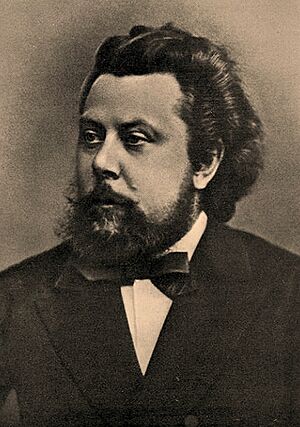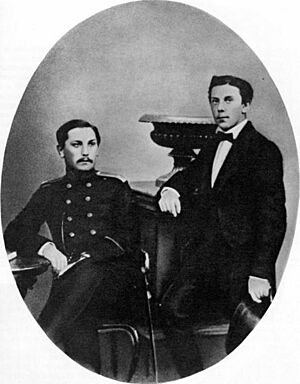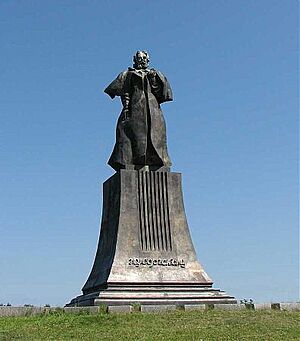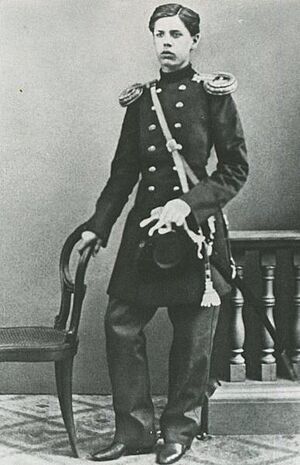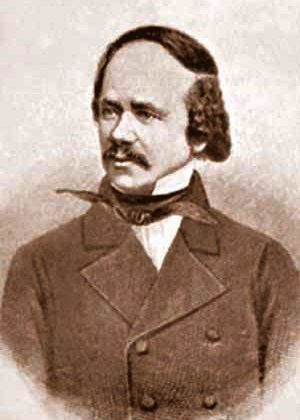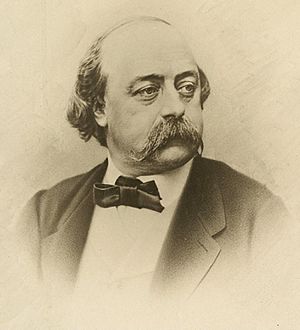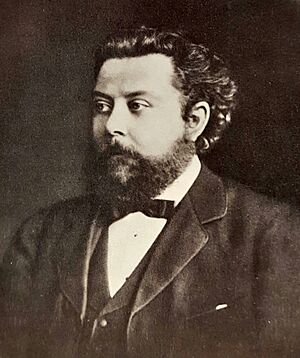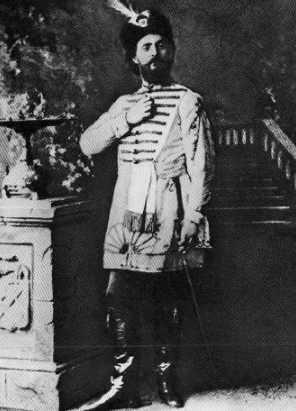Modest Mussorgsky facts for kids
Modest Petrovich Mussorgsky (Russian: Модест Петрович Мусоргский, tr. Modest Petrovich Musorgsky, IPA: [mɐˈdɛst pʲɪˈtrovʲɪtɕ ˈmusərkskʲɪj]; born March 21, 1839 – died March 28, 1881) was a famous Russian composer. He was part of a group known as "The Five". Mussorgsky was a pioneer in Russian music during the Romantic period. He wanted to create music that sounded truly Russian, often different from the usual Western European styles.
Many of his musical pieces were inspired by Russian history, old Russian stories (folklore), and other national themes. Some of his most famous works include the opera Boris Godunov, the orchestral piece Night on Bald Mountain, and the piano suite Pictures at an Exhibition.
For many years, people mostly knew Mussorgsky's music through versions that other composers had changed or finished. However, today, many of his important works are enjoyed in their original forms, and some of his first musical notes are now available.
Contents
About His Name
The way Mussorgsky's name is spelled and said can be a bit confusing.
His family name comes from an ancestor named Roman Vasilyevich Monastyryov, who lived in the 1400s or 1500s. Roman Vasilyevich had the nickname "Musorga," which meant 'music maker.' The composer could trace his family back to Rurik, a legendary founder of the Russian state.
In Mussorgsky family papers, the name was spelled in different ways. The "g" in Mussorgsky's name first appeared in a letter in 1863. He used this new spelling for the rest of his life. It is thought that his older brother, Filaret, added the "g" to make the name sound less like a Russian word for "rubbish."
In Russia today, the name is usually stressed on the first part (MÚS-ər-skiy). However, in Western countries, it's often stressed on the second part (Mu-SÓRK-skiy). This different stress might have come from his brother's family.
The name 'Modest' comes from a Latin word meaning 'moderate' or 'restrained.' His close friends and family called him "Modinka."
His Life Story
Early Years and Music
Modest Mussorgsky was born in Karevo, a village about 400 km (250 miles) south of Saint Petersburg, Russia. His family was wealthy and owned land. They were said to be descendants of Rurik, an early Russian ruler.
Modest started piano lessons with his mother when he was six years old. He learned very quickly. By age nine, he could play difficult pieces for his family and friends. When he was 10, he and his brother went to Saint Petersburg to study at a special German school. There, Modest continued his piano lessons. In 1852, when he was 12, he even published a piano piece called "Porte-enseigne Polka."
His parents wanted him to join the military, following a family tradition. So, at 13, Mussorgsky entered the Cadet School of the Guards. This school was known for being very strict.
Even in military school, music remained important to him. He was allowed to attend piano lessons. His piano skills made him popular among his fellow cadets, for whom he would play dances and his own musical ideas. In 1856, Mussorgsky graduated from the Cadet School. He then joined the Preobrazhensky Regiment, a top regiment in the Russian Imperial Guard.
Becoming a Composer
In 1856, when he was 17, Mussorgsky met Alexander Borodin, who was also a composer. They became good friends.
That winter, Mussorgsky met Alexander Dargomyzhsky, who was a very important Russian composer at the time. Dargomyzhsky was impressed by Mussorgsky's piano playing. Mussorgsky started spending a lot of time at Dargomyzhsky's musical gatherings. A critic named Vladimir Stasov later said that this is where Mussorgsky's "true musical life" began.
Over the next two years, Mussorgsky met other important people in Russian culture, including Stasov, César Cui, and Mily Balakirev. Balakirev had a big impact on him. Balakirev helped Mussorgsky learn about music forms by playing symphonies and other works together on the piano. Before this, Mussorgsky only knew piano music. Balakirev helped him learn about more modern and complex music.
In 1858, Mussorgsky left the military to focus completely on music. He also went through a difficult personal time. In 1859, he gained experience working on an opera by Mikhail Glinka. He also visited Moscow, which made him feel a strong love for "everything Russian."
Despite his love for Russian themes, Mussorgsky's early music sometimes sounded more like foreign styles. He worked on a play called Oedipus in Athens and a piano piece, but he left them unfinished. Around this time, his family lost a lot of their land because of the emancipation of the serfs. Mussorgsky had to spend time trying to help his family, which made it hard to compose.
By this time, Mussorgsky was teaching himself music, moving away from Balakirev's direct influence. In 1863, he started an opera called Salammbô, but he stopped working on it in 1866. During this period, he returned to Saint Petersburg and worked as a civil servant. He lived with other artists and thinkers, discussing new ideas about art and science. He became interested in showing "real life" in his music, focusing on everyday people and rejecting strict musical forms.
In 1865, Mussorgsky's mother died, which was a sad time for him. However, he soon started writing his first realistic songs, like "Hopak" and "Darling Savishna." In 1867, he finished the original version of his orchestral piece Night on Bald Mountain.
Peak of His Career
Mussorgsky's job as a civil servant was not very stable. He often had to change positions and sometimes did not get paid. However, his musical life was developing greatly. In 1867, the group of Russian composers around Balakirev was first called 'kuchka' (meaning 'bunch'). Mussorgsky was becoming more independent from Balakirev and closer to Alexander Dargomyzhsky. Inside 'The Five,' Mussorgsky was known as 'Humour.'
Dargomyzhsky had been working on his opera The Stone Guest, trying to set the words exactly as they were, without separating singing into arias and recitatives.
Inspired by Dargomyzhsky's ideas, Mussorgsky quickly set the first eleven scenes of Nikolai Gogol's play The Marriage (Zhenitba) in 1868. He wanted to capture the natural sounds and rhythms of everyday speech in the music. He left this work unfinished, but his unique way of setting words to music appeared in all his later vocal pieces.
A few months later, Mussorgsky, then 29, was encouraged to write an opera about the story of Boris Godunov. He wrote the text using parts of Pushkin's play and Karamzin's history. He finished the large score the next year. However, in 1871, the opera was rejected for performance, possibly because it didn't have a main female role. Mussorgsky then created a revised and larger 'second version.' He made more changes than the theater asked for. This new version was accepted, and three parts of it were performed in 1873.
The first full performance of Boris Godunov was in February 1874. Even though critics were not very positive, the audience loved it. This was the highest point of Mussorgsky's career.
Later Years and Challenges
After the success of Boris Godunov, Mussorgsky's life became more difficult. The group 'The Five' was breaking apart, which made him very sad. He felt that his old friends were becoming "soulless traitors." He also faced personal health issues. His friend Viktor Hartmann died, and his relative Arseny Golenishchev-Kutuzov moved away.
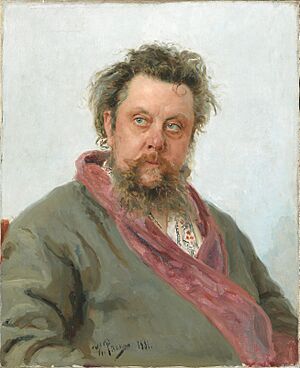
Despite these challenges, Mussorgsky continued to compose for a while. In 1874, he wrote Sunless, the Prelude to Khovanshchina, and the piano suite Pictures at an Exhibition (in memory of his friend Hartmann). He also started another opera, The Fair at Sorochyntsi.
In the years that followed, Mussorgsky's health and financial situation worsened. His job in the civil service became uncertain because he was often ill and absent. He was lucky to get a transfer to a department where his boss, who loved music, was very understanding. This boss even let him tour twelve cities as a singer's accompanist in 1879.
However, his decline continued. In 1880, he was finally dismissed from government service. Friends tried to help him by raising money so he could finish his operas, Khovanshchina and The Fair at Sorochyntsi. But he could not complete either work.
In early 1881, a desperate Mussorgsky told a friend that he had "nothing left but begging." He suffered several seizures. Although he was admitted to a good hospital and seemed to get better for a few weeks, his condition was hopeless. The famous painter Ilya Repin painted his portrait just days before Mussorgsky died. A week after his 42nd birthday, he passed away. He was buried in the Tikhvin Cemetery in Saint Petersburg.
Mussorgsky and other members of 'The Five' were seen as very modern by the Emperor and his court. This might be why Tsar Alexander III personally removed Boris Godunov from the list of operas for the Imperial Opera in 1888.
His Musical Works
Mussorgsky's music was very new and unique, but it still fit into the Romantic style. It often used Russian musical themes. He has inspired many Russian composers, including Dmitri Shostakovich and Sergei Prokofiev.
In 1868 and 1869, he composed the opera Boris Godunov, which tells the story of a Russian tsar. The Mariinsky Opera initially rejected it. So, Mussorgsky revised the work, creating a final version in 1874. The first version is thought to be darker and shorter, but also less refined. Other composers, like Nikolai Rimsky-Korsakov and Shostakovich, later re-orchestrated and revised the opera.
The opera Khovanshchina was not finished when Mussorgsky died. Nikolai Rimsky-Korsakov completed it, and it was first performed in 1886. Shostakovich also revised this opera. The Fair at Sorochyntsi, another opera, was also left incomplete. However, a dance from it, the Gopak, is often performed.
Mussorgsky's most creative and often-played work is the piano suite Pictures at an Exhibition. This piece describes paintings through music. It is best known through an orchestral version by Maurice Ravel. Mussorgsky wrote it to remember his friend, the architect Viktor Hartmann.
Mussorgsky's orchestral piece Night on Bald Mountain became very popular in the 1940s. It was featured in the 1940 Walt Disney animated film Fantasia.
Among his other works are many songs, including three song cycles: The Nursery (1872), Sunless (1874), and Songs and Dances of Death (1877). He also wrote Mephistopheles' Song of the Flea and many others.
What People Thought of Him
People at the time had different opinions about Mussorgsky as a composer and a person. Even his later supporters, Vladimir Stasov and Mily Balakirev, at first had negative impressions. Stasov wrote to Balakirev in 1863, "I have no use for Mussorgsky. All in him is weak, dull."
Nikolai Rimsky-Korsakov and Pyotr Ilyich Tchaikovsky, who were also composers, had mixed feelings. They praised his talent but were disappointed with his musical technique. When preparing an edition of Sorochintsï Fair, Anatoly Lyadov said, "It is easy enough to correct Mussorgsky's mistakes. The only problem is that when this is done, the special character and originality of the music disappear."
Western views of Mussorgsky changed after Boris Godunov was first performed in Europe in 1908. Before that, he was seen as an unusual composer in the West. A critic named Edward Dannreuther wrote in 1905 that Mussorgsky's vocal music seemed "wildly strange" and "barbarously ugly." However, after the opera's premiere, opinions changed greatly. Gerald Abraham, a music expert, said that Mussorgsky was "unsurpassed" at putting words and emotions into music. But he also noted that Mussorgsky had limited ability in creating pure musical structures.
See also
 In Spanish: Modest Músorgski para niños
In Spanish: Modest Músorgski para niños


